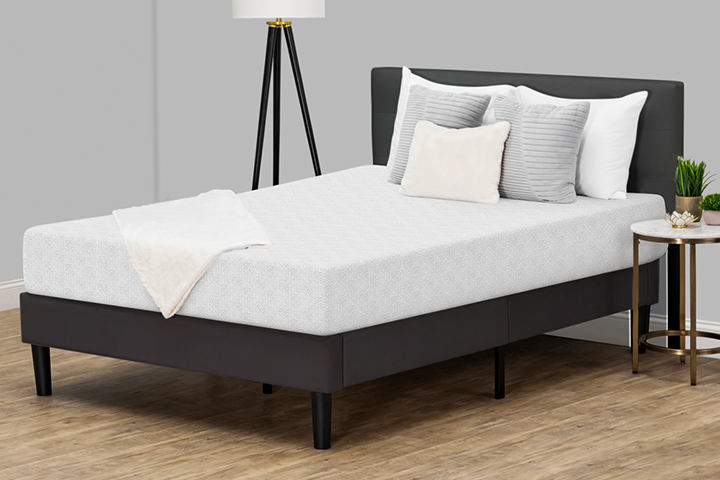Mattress Shopping Made Easy: Top 10 Questions to Ask Yourself Before Investing in a New Bed
Posted by Finny F on 24th Jun 2023
The first thing you need for sleeping is a good mattress, even without a bed frame it ensures you get quality sleep. Investing in a new mattress can be overwhelming with all the types, sizes, features, and price points.
But fear not! We have a list of the most common questions to ask yourself before investing in a new bed that will make your mattress shopping experience stress-free. So let’s dive into these questions together and find you the perfect mattress for sweet dreams ahead!
Top 10 Questions to Ask Yourself Before Investing in a New Bed

1. Why Do You Need a New Mattress?
Your mattress should ensure you get a good night's rest. But how do you know when to replace your old one? There are several signs that indicate the need for a new mattress.
Firstly, it may be time for an upgrade if your mattress is 8 years old. Over time, mattresses lose their firmness and support, and can lead to poor spine alignment and discomfort.
Secondly, if you get up stiff, it could be due to the lack of proper support. A new mattress with better pressure relief can help alleviate these issues.
Thirdly, if you notice visible wear and tear such as sagging or lumps on your mattress surface, this indicates that your bed has lost its structural integrity.
Allergies can also play a factor in needing a new mattress because dust mites accumulate over time on older beds.
2. What Mattress is Best for You?
When choosing a mattress, there are several available types. The most popular ones include memory foam, latex, innerspring, and hybrid mattresses. Each type has its set of unique features for different needs.
Memory Foam Mattress
Memory foam mattresses conform closely to the body’s shape and provide excellent pressure relief while reducing motion transfer. These are perfect for individuals with chronic pain or those who frequently change positions during sleep.
Latex Mattress
Latex mattresses offer good support with natural materials that allow air circulation for a cool sleeping experience. These are ideal if you’re looking for something eco-friendly and hypoallergenic.
Innerspring Mattress
Innerspring mattresses have been around for years and consist of coils topped with padding layers. They provide excellent support but may not be suitable if you’re looking for something that offers contouring comfort.
Hybrid Mattress
Hybrid mattresses combine elements from both memory foam and innerspring technologies, offering the best of both worlds – great support as well as comfortable cushioning layers.
The best type of mattress depends on your personal preference based on factors such as sleeping position, temperature preferences, medical conditions etc.
3. How Much Should You Spend?
Buying a new mattress is an investment, and it's crucial to establish how much you're prepared to spend. The price of mattresses depends on the type, brand, and size.
When considering how much to spend, remember that this is investing in your health. You want to get the best quality mattress possible within your budget.
It's recommended that you allocate at least $500 for a high-quality queen or king-sized mattress. If you have specific needs such as back pain or sleep apnea, investing more money into a specialized mattress may be necessary.
While it may be tempting to opt for the cheapest option available, cheaper mattresses lack durability and comfort. Inexpensive options also often require replacement sooner than later.
When deciding how much money to spend on a new bed, it’s crucial to find the perfect balance between affordability and quality – Investing in good sleep will never go out of style!
4. What Size Mattress Do You Need?
Choosing the size of mattress is crucial for your comfort. The size you need will depend on factors such as the number of people sharing the bed, body sizes, and room space.
If you are single and have limited living space, a twin or full-size mattress may be suitable. However, if you're taller than average, consider purchasing an XL version of those sizes.
On the other hand, if you sleep with a partner or pets, go for larger options like queen or king-sized mattresses. These provide ample space for both parties without disturbing each other during sleep.
Considering these factors when choosing your new mattress size will help improve your quality of sleep, and ensure that everyone can comfortably share it while maximizing living space in your bedroom!
5. What Firmness Level Do You Prefer?
When mattress shopping, one of the most important factors to consider is the firmness level. This refers to how hard or soft a mattress feels when you lie on it. Firmness levels are often categorized as soft, medium, or firm.
Soft Mattress
Soft mattresses are typically best for those who prefer a plush feel and need more pressure relief due to arthritis or fibromyalgia. Medium-firm mattresses work well for combination sleepers who shift positions throughout the night while still providing adequate support.
Firm Mattress
Firm mattresses provide great support for back sleepers as they help maintain proper spinal alignment. However, they may not be suitable for side sleepers as they put too much pressure on joints causing discomfort.
Test out different firmness levels before making a purchase. Remember that personal preference plays a significant role in determining which firmness level suits you best.
Additionally, keep in mind that weight also affects how firm or soft a mattress feels. Heavier individuals may require firmer beds because they sink deeper into softer materials leading to inadequate spine alignment and overall back pain.
6. Do You Have Special Preferences?
When buying a new mattress, it's important to consider special preferences. This can include back pain, allergies, or even just personal comfort preferences.
Consider the type of material used in the mattress. If you have allergies, look for mattresses with hypoallergenic materials such as latex or memory foam. For those with back pain, a firmer mattress is more supportive and comfortable.
Another consideration is your sleeping position. Side sleepers may prefer a softer mattress that allows their hips and shoulders to sink in while back sleepers may need a firmer surface for proper spinal alignment.
For couples who have different preferences, there are mattresses available with dual firmness options that cater to both partners' needs.
Taking special needs into account can ensure that your investment will provide the best possible sleep experience for you.
7. Do You Need Special Features like Cooling or a Pillow Top?
When purchasing a new mattress, there are special features that enhance your sleep quality. Two popular options are cooling technology and pillow tops.
If you tend to overheat at night, investing in a mattress with cooling technology may be worth considering. These mattresses use gel-infused foam or breathable fabrics to regulate temperature and prevent heat buildup.
Pillow tops are great if you need extra cushioning and support. This added layer of padding provides a soft surface for your body while still maintaining necessary firmness from the underlying materials of the mattress.
Note that these special features often come with an additional cost. Consider whether they align with your budget and personal preferences before making a decision.
8. What is the Warranty and Return Policy?
When investing in a new mattress, consider the warranty and return policy. Mattresses come with a warranty that ranges from 10-25 years depending on the manufacturer. It’s important to read the fine print of your warranty to ensure you’re aware of what exactly is covered.
When returning a mattress, policies vary between retailers. Some offer a 30-120 days trial period before deciding if you want to keep the mattress or not. Others may have stricter policies and only accept returns if there are defects or damages.
It’s also worth noting that some retailers charge restocking fees for returned mattresses, so factor this into your decision-making process.
If you have any concerns about the warranty or return policy, don’t hesitate to reach out and ask questions before purchasing. A reputable retailer will be happy to provide clarity on these matters and help put your mind at ease when investing in a new bed.

9. What are the Delivery and Setup Options?
Once you've decided on the perfect mattress, it's important to consider delivery and setup options. Check if the retailer or manufacturer offers free shipping or delivery. Some companies may also offer white-glove delivery service where they will set up your new mattress in your home and remove any packaging materials.
If you're purchasing a larger bed size or have limited mobility, it may be worth paying for professional installation to ensure safe and proper setup. Additionally, check with the company about their availability for scheduling deliveries at a time that works best for you.
Ask about any additional fees associated with delivery and setup as well as their return policy in case any issues arise during the process. It's always better to be informed upfront rather than surprised later on.
Choosing a company that offers convenient and reliable delivery and setup options can make all the difference when investing in a new mattress.
10. How Often Should You Replace Your Mattress?
Investing in a new mattress is an important decision that affects the quality of your sleep and overall health. By asking yourself these questions before making decisions, you'll be able to find the best mattress for your needs.
Remember to consider factors such as type, size, firmness level, special features, warranty and return policy, delivery options and setup when choosing a new bed. And don't forget to replace your mattress every seven to ten years or when it starts showing signs of wear and tear.
Investing in a comfortable and supportive mattress at Icon Sleep is worth it for a good night's rest. Sweet dreams!

